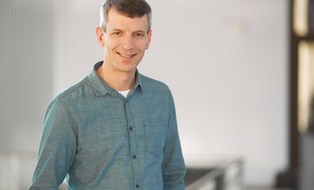Felix Mueller-Planitz
Biosketch and CV
 © J. Greune
© J. Greune
Prof. Dr. rer. nat. Felix Müller-Planitz
Group Leader
Send encrypted email via the SecureMail portal (for TUD external users only).
Visiting address:
Medizinische Fakultät der TU Dresden
Institut für Physiologische Chemie, 1st floor, room A.10.048
Fiedlerstraße 42
01307 Dresden
Felix Müller-Planitz received his Ph.D. from Stanford University for mechanistic work on DNA topoisomerase II using biochemical and biophysical methods, in particular transient kinetic approaches. For his Postdoc, he switched fields and joined Prof. Becker’s lab at the LMU in Munich, where he got exposed to the world of chromatin that continues to be his home to date.
The Mueller-Planitz lab studies core components of chromatin – the nucleosomes and the machinery that places them in the genome. Nucleosomes are crucial to human health. Aging, for instance, disrupts the nucleosome landscape, destabilizing the genome, and mutations in nucleosomes are drivers of cancers. Nucleosomes serve both as barriers that restrict access to the genome and as a medium to accumulate epigenetic marks. Correspondingly, the locations of nucleosomes in the genome are precisely controlled by so called nucleosome remodeling complexes. Remodelers move, assemble, or eject nucleosomes in an ATP-dependent fashion. Some also even the spacing between nucleosomes, setting a characteristic nucleosome-to-nucleosome distance. These ‘spacing remodelers’ thereby generate arrays of nucleosomes with a surprising regularity, and these arrays are conserved throughout eukaryotes. Their function however remains elusive.
The overarching aim of the Mueller-Planitz lab is to elucidate the biogenesis of the nucleosome landscape and dissect its biological function under physiological and pathological conditions. To achieve this goal, his lab bridges methodologies of molecular biology, genetics, genomics, biophysics, structural biology, and enzymology. They develop cutting-edge technology to visualize individual nucleosome patterns in single cells, to deduce systems-level properties of tens of thousands of nucleosomes in cells, and to dissect the mechanism of nucleosome remodeling genome-wide in vivo and in vitro.
| Year | Function | Institute |
| since 2020 | Professor | Institute of Physiological Chemistry, Faculty of Medicine, TU Dresden |
| 2012-2019 | Group Leader | Dept. Molecular Biology, Biomedical Center, LMU Munich |
| 2010-2011 | Lecturer | Adolf-Butenandt-Institute, LMU Munich |
| 2007-2010 | Postdoctoral researcher | Peter Becker lab, Molecular Biology Division, LMU Munich |
| 2006 | PhD in Biochemistry | Stanford University, USA, Advisor: Dan Herschlag |
